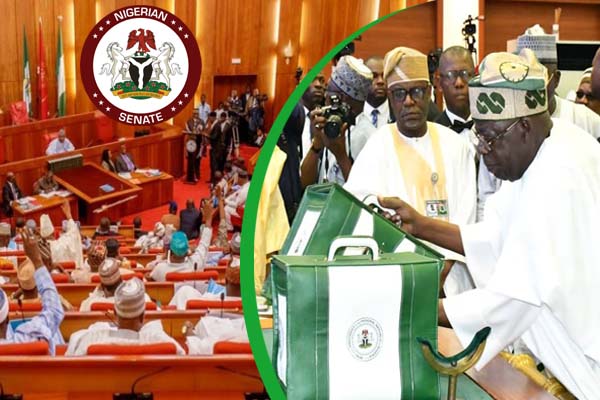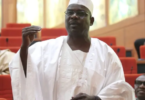
Estimates for the 2024 National Budget went up by N1.2 trillion yesterday as the National Assembly rounded off its consideration of the Appropriation Bill.
The two chambers at a special session, passed the budget at N28.78 trillion as against the N27.50 trillion presented to it by President Bola Tinubu on November 29.
The lawmakers also increased the exchange rate from N750 to N800 per dollar but the 1.78mbpd daily oil production, US$77.96 oil benchmark price and GDP growth rate of 3.88% were approved as proposed by the President.
Sequel to the adjustments to the budget proposals, N1.74 trillion is for Statutory Transfer; N8.77 trillion is for Recurrent Expenditure; N9.99 trillion is for Capital Expenditure; and N8.27 trillion is for Debt Service.
The capital budget increased from the N8. 7 trillion proposed by the President to N9. 995 trillion, while the recurrent budget was reduced from N9. 92 trillion to N8. 76 trillion.
The National Assembly adopted the harmonized report of its joint Committees on Appropriations presented to the Senate by Solomon Adeola (APC, Ogun West) and in the HoR by Abubakar Kabir Bichi.
Speaking before the budget was passed, House of Representatives Speaker, Tajudeen Abass, said future budgets would be taken to the people at the constituency level to allow them also to make inputs.
He said “as representatives of the people, it is essential that we involve citizens in our key processes and decision-making.
“It was in line with this that the House organised a citizens’ town hall on the 2024 Appropriation Bill, where the public was given the opportunity to express views on how the budget can better address the specific needs of all Nigerians, especially those at the grassroots.
“The House remains committed to engaging citizens in its activities and ensuring the lawmaking process is open and inclusive. In the coming years, the budget will be taken to the people at the constituency levels to allow them also to make inputs.”
Speaking with newsmen after the budget passage, Chairman of the House Committee on Appropriation Bichi, said the increase was occasioned by prevailing circumstances in the country as well as the current exchange rate.
He said after their meeting with the leadership of government owned enterprises (GOEs), it was agreed that the revenue estimate given to them was unrealistic and the fact they have to increase their revenue contribution to funding the budget.
He said the GOEs were expected to contribute about N700 billion to the budget, adding that in addition to the gain from the increase in the exchange rate, the country would be able to generate the N12 trillion increase in the budget.
He said “We have inflation and exchange rate for the dollar, the executive proposed N750 to the dollar, but after we studied carefully, we looked at it, it is unrealistic. So we increased it to N800.
“Also we had a meeting with the GOEs, we believe that their submissions were not enough. They have agreed to increase their revenue to 700 billion. That was how we were able to get that 1.2 trillion which we applied to capital.
“This is the first time capital expenditure is bigger than recurrent. We appropriated about N850 billion for education. We gave them a lot of money. I believe this budget is brilliant and Nigerians will see a lot of impact.”
Under the Statutory Transfer, National Judicial Council (NJC) got the highest allocation of N341.626 billion; followed by Niger Delta Development Commission (NDDC) with N338.925 billion; Universal Basic Education Commission (UBEC) gets N263.044 billion; North East Development Commission (NEDC) – N131.836 billion.
Others include Basic Healthcare Provision Fund (BHPF) – N131.522 billion; National Agency for Science and Engineering Infrastructure (NASENI) – N131.522 billion; Public Complaint Commission (PPC) – N14.460 billion; and N5 billion for National Human Rights Commission (NHRC), respectively.
Ministry of Defence got the highest allocation of N1.308 trillion, followed by Ministry of Police Affairs – N869.121 billion; Ministry of Education – N857.134 billion; Ministry of Health & Social Welfare – N667.577 billion; Ministry of Interior – N362.552 billion; Ministry of Youth – N201.467 billion; National Security Adviser (NSA) – N199.763 billion; Ministry of Foreign Affairs – N140.456 billion; Ministry of Agriculture & Food Security – N110.248 billion; Secretary to the Government of the Federation (SGF) – N100.248 billion and Presidency – N97.913 billion.
Senate,HoR approve securitization of N7.388 Ways and Means
Also yesterday,the two chambers considered and passed the securitisation of outstanding 7.388trn debit balance (Ways and Means) in the Consolidated Revenue Fund (CRF) following a request by President Tinubu.
Tinubu, in a letter read by Senate President Akpabio and HoR Speaker Abass, said while the Federal Government was considering various measures to forestall the use of Ways and Means advances for domestic debt servicing, it had become imperative to securitize the outstanding Ways and Means advanced to the FGN, before the end of the year 2023.
Tinubu said the securitization of the Ways and Means would lead to the realization of many benefits.
The letter reads, “I write to draw the kind attention of the House of Representatives to the provisions of Section 38 of the subsisting Central Bank of Nigeria, (CBN)’s Act 2007, which stipulates that the apex bank may grant temporary advances to the Federal Government in respect of temporary deficiency of budget revenue. provided such overdraft do not surpass five percent of the government’s revenue from the previous year.
“The House is invited to note that, from available information by the CBN, the Consolidated Revenue Fund (CRF) Account of the Federal Government of Nigeria (FGN) stood at N7,388,696,034,520.87 as at December 11 2023. largely due to domestic debt servicing, principal and interest
“While the Federal Government is considering various measures to forestall the use of ways and means advances for domestic debt servicing, it has become highly imperative to securitize the outstanding ways and means advanced to the FGN, before the end of the year 2023 The securitization of the “Ways and Means will lead to the realization of the following benefits amongst others
“a) Reduction of Debt Service Cost, as the Interest Rate for the securitized ways and means advances is lower at 9% p.a compared to MPR-3%
“b) The savings arising from the much lower Interest Rate could help to reduce the deficit in the Budget
“c) Improvement in debt transparency as securitized Ways and Means Advances are included in the public debt statistics.
“In view of the foregoing the House of Representatives is invited to kindly consider and approve the securitization of the outstanding debit balance of N7,388,696,034,520.87 in the CRF as at December 11, 2023.”
Senate okays Tinubu’s request to borrow $7.8bn, €100m
The Senate separately approved President Tinubu’s request to borrow $7.8billion and €100 million as part of the 2022 – 2024 borrowing plan of the Federal Government.
The resolutions of the Senate followed its consideration and adoption of the report of its committee on Local and Foreign Debt during its special plenary.
Tinubu had said that the Federal Executive Council under former President Muhammadu Buhari approved the loan facility on May 15, 2023 to finance infrastructure, health, education, agriculture, insecurity and other sectors.
He further explained that the foreign loan had become necessary to bridge the financial gap and return the economic activities of the country to normalcy.
The funds, he said, would be used to develop infrastructure, agriculture, health, education, water supply, security and employment as well as financial management reforms.










Leave a Comment